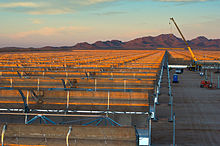Solana Generating Station
| Solana Generating Station Project | |
|---|---|

Assembly of the parabolic mirrors
|
|
| Country | United States |
| Location | Maricopa County |
| Coordinates | 32°55′N 112°58′W / 32.917°N 112.967°WCoordinates: 32°55′N 112°58′W / 32.917°N 112.967°W |
| Status | Operational |
| Construction began | December 2010 |
| Commission date | 2013 |
| Construction cost | US$2 billion |
| Owner(s) |
Atlantica Yield Liberty Interactive Corporation |
| Operator(s) | Arizona Solar One LLC |
| Solar field | |
| Type | CSP |
| CSP technology | Parabolic trough |
| Collectors | 3,232 |
| Total collector area | 2,233,958 square metres (552.023 acres) |
| Site area | 1,920 acres (780 ha) |
| Power generation | |
| Units operational | 2 |
| Make and model | Siemens |
| Nameplate capacity | 280 MW |
| Storage capacity | 6 hours |
| Planned gross output | 944 GW·h |
The Solana Generating Station is a solar power plant near Gila Bend, Arizona, about 70 miles (110 km) southwest of Phoenix, completed in 2013. When commissioned it was the largest parabolic trough plant in the world and the first U.S. solar plant with molten salt thermal energy storage. Built by the Spanish company Abengoa Solar, it has a total capacity of 280 megawatts (MW) gross, from two 140 MW gross (125 MW net) steam turbine generators, which is enough to power 70,000 homes while avoiding around 475,000 tons of CO2 every year. Its name is the Spanish term for "sunny spot".
The plant employs a proprietary concentrating solar power (CSP) trough technology developed by Abengoa, and covers an area of 1,920 acres (780 ha). Construction was expected to create about 1,500 construction jobs with the plant employing 85 full-time workers. Solar thermal plants use substantially more water for cooling than other solar generating technologies. Nevertheless, the Sierra Club supports the Solana plant, because it will be built on private land, and use "75 to 85 percent less water than the current agricultural use."
Arizona Public Service (APS) has contracted to purchase 100% of the power output generated from Solana, to meet the Arizona Corporation Commission's (ACC) mandate that the state's regulated utilities provide 15% of their electricity from renewable energy sources by 2025. APS will pay about 14 cents per kWh. The Solana plant was originally planned to open in 2011 and was estimated to cost $2 billion. In December 2010, Abengoa received a $1.45 billion loan guarantee to support construction of the plant.
...
Wikipedia

